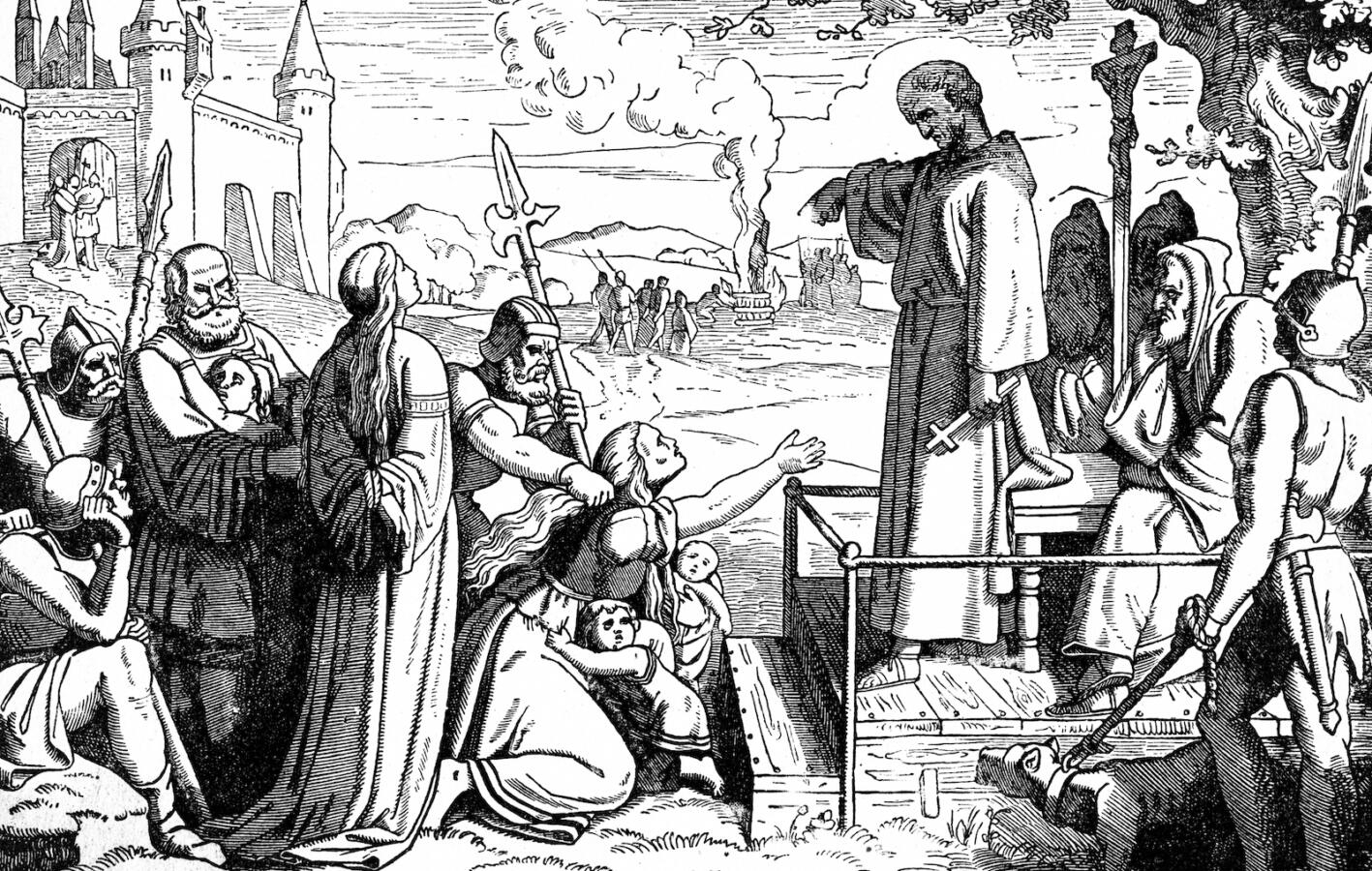Martyrdom refers to suffering and often death on account of one’s beliefs, particularly religious beliefs. The word itself comes from the Greek meaning “witness,” but its more common meaning emerged among early Christians, who saw Jesus’ death on the cross as the archetype of martyrdom. No precise equivalent exists in Judaism. The most common descriptor of a Jewish martyr is kadosh (plural: kedoshim), which literally means holy one. Similarly, someone who dies a martyr is said to have died al kiddush hashem, for the sanctification of God’s name, though one can also perform a kiddush hashem in other ways, such as by acting nobly in a way that reflects well on the Jewish people.
The use of kiddush hashem to describe martyrs originates in the Talmud, where the rabbis taught that one is supposed to forfeit their life to avoid transgressing any of Judaism’s three so-called cardinal sins: idolatry, sexual immorality and murder. Violating one of those commandments to save one’s life was considered a hillul hashem, or desecration of God’s name. Those who chose the opposite were martyrs. Over time, this term came to be used to refer to anyone who died simply for being Jewish. This became particularly evident after the Holocaust, whose victims are almost universally regarded as martyrs even though they do not meet the ancient definition. Israeli soldiers who died in defense of the state are also sometimes referred to as martyrs.
Martyrdom in Antiquity
Depending on the particular definition of martyrdom, there may or may not be examples of Jewish martyrs in the Bible. Some consider those willing to die to be martyrs, even if they are ultimately spared. Both Isaac, who was willing to be sacrificed at God’s instruction, and the three figures from the Book of Daniel — Hananiah, Mishael and Azariah — who were thrown into a furnace rather than worship idols but were saved by God, meet this definition. King Saul, who committed suicide rather than be captured and defiled by the Phillistines, is also commonly seen as a martyr, though not all scholars believe he qualifies. The same is true of a woman named Hannah and her sons, whose story of choosing death rather than eating pig’s meat on the order of Antiochus is related in the Books of Maccabees (2nd Maccabees 7 and 4th Maccabees).
Among the best-known instances of Jewish martyrdom in the ancient world is the first century mass suicide at Masada, where some 967 Jews, the last holdouts of the war with Rome that resulted in the destruction of the Second Temple, fended off the Roman legions from a mountaintop redoubt southeast of Jerusalem for several months before taking their own lives rather than face capture. The site is today a major tourist attraction and the actions of those Jews who died there rather than surrender was celebrated by early Zionists as a model of Jewish heroism. But their actions have been criticized by some Jewish authorities who argue that suicide is not a religiously legitimate response to political subjugation.
With your help, My Jewish Learning can provide endless opportunities for learning, connection and discovery.
Less controversial are the Ten Martyrs, ten rabbis of the mishnaic period who were tortured and killed by the Romans. Memorialized in the Midrash Eleh Ezkerah (“These I Will Remember”), the stories of their deaths are part of the Yom Kippur liturgy, recounted on the holiest day in the Jewish calendar. Best-known of the ten is Rabbi Akiva, who violated the Roman prohibition on Torah study and was flayed alive. As related in the Talmud, Akiva recited the Shema prayer as he was being killed. When he was questioned by his students about this, he replied that he was happy that for the first time in his life he was able to fulfill the biblical commandment related in the Shema to serve God with all his soul.
Martyrdom in the Middle Ages
The medieval period provides many examples of Jewish martyrdom, most prominently during the Crusades, the Christian wars to recapture Jerusalem that began in the 11th century. Many Jews were massacred outright during this period, while others were forced to convert on threat of death, both in Christian and Muslim lands. Jews who were murdered in this period are generally regarded as martyrs though they did not meet the ancient definition of the term. Others chose suicide — and in some cases killed their own children — rather than accept forced conversion, raising complicated questions about whether that choice is religiously valid.
Medieval religious authorities differed on this question. In his Epistle on Martyrdom, Maimonides wrote that Jews faced with the choice between death and proclaiming adherence to Islam should choose the latter, arguing that making a mere declaration does not qualify as a sin that requires one to die rather than commit it. He further ruled that a Jew who elected to violate a cardinal commandment instead of submit to death, as the Talmud requires, should not be regarded as either a sinner or even a non-Jew.
The Tosafot, the talmudic commentary authored over several generations by scholars in France and Germany — locations, it should be noted, where the threat of death or conversion was acute in medieval times — ruled differently. Not only did they believe it permissible to choose martyrdom in situations where the Talmud didn’t require it, but they allowed suicide — and even parents killing their children — to avoid facing a choice between conversion and death.
Among the best-known examples of this is Yom Tov of Joigny, a Tosafist and liturgical poet born in France who resettled in York, England. In 1190, Yom Tov and the other Jews of York took refuge in a castle as a mob outside demanded their death or their conversion. Most of the Jews committed suicide instead, with men killing their families and then killing each other before Yom Tov took his own life.
The widespread persecution of Jews during this period gave rise to a rich literature, some of which features prominently in Jewish liturgy even today. Following the murder of thousands of Jews living along the Rhine River in central Europe in 1096, the prayer Av Harachamim was composed. Still recited today in Ashkenazi synagogues each Shabbat, the prayer asks for God’s mercy for “the holy communities who gave up their lives for the sanctification of God’s name.”
Another example is Unetaneh Tokef, today the centerpiece of the High Holiday liturgy. Legend has it that the prayer was composed in the 11th century by Rabbi Amnon of Mainz, Germany, who was dismembered for refusing to embrace Christianity. On Rosh Hashanah, Amnon was carried into the synagogue where he recited Unetaneh Tokef before expiring.
The Holocaust
Today, it’s not uncommon to refer to anyone who has died for simply being Jewish as a martyr. This includes victims of antisemitic violence, and especially those murdered in the Holocaust. The 1959 Israeli law establishing the 27th of Nisan as Holocaust Remembrance Day was called the Martrys’ and Heroes’ Remembrance Day Law. Similarly, the 1953 law establishing the authority that created Israel’s national Holocaust museum refers to Holocaust “martyrs and heroes.” Memorial prayers for Holocaust victims almost universally refer to them as kedoshim who died al kiddush hashem.
The Jewish studies scholar Shira Lander has written that regarding Holocaust victims as martyrs represents a sharp departure from the way that concept had been understood for centuries, as a choice to accept death rather than violate a core Jewish commandment. During the Holocaust, in contrast, Jews were murdered regardless of their behavior. “This post-Shoah theology has permeated Jewish consciousness so deeply that it distorts our understanding of pre-modern notions about martyrdom,” Lander writes.
The inclusion of Israel’s fallen soldiers in the ranks of Jewish martyrs, though by no means as widespread as Holocaust victims, represents an even starker departure from traditional Jewish thinking on this subject. Their inclusion runs into the same problems as Holocaust victims; soldiers don’t “choose” to die in most cases, and in Israel most don’t even choose to serve, as conscription is mandatory for most adults. Naming them as martyrs also conflates dying in defense of the Jewish state with dying in defense of Judaism.
Though some memorial prayers for Israeli soldiers describe them as dying al kiddush hashem, this is not always the case. And while some consider not only Israeli soldiers, but even Israeli settlers and those who died “defending the Jewish people’s way of life” to be martyrs too, this is not universally accepted even among Orthodox authorities. “If someone went to fight the enemy voluntarily — nobody forced him, only that his conscience told him to go out and protect the Jews from an enemy, then perhaps you could say that,” the American Rabbi Avigdor Miller has written. “But if a man is drafted into the Israeli army without any intention except to do his stint and then get out, so you can’t call him a martyr for kiddush Hashem if he falls in battle.”



